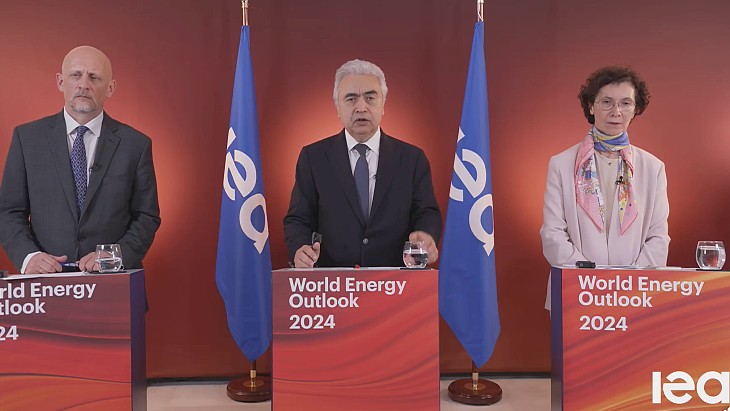Decarbonising nuclear supply chain logistics
.jpg)
A strategic partnership has been signed between Fret SNCF, Société de Transports Spéciaux Industriels (STSI) and Orano NPS to promote the development of rail transport of Orano nuclear materials in Europe, Orano said on 2 December. This follows the acquisition by Orano Nuclear Packages & Services of STSI, which was announced on 2 November.
"For Orano, the objective of this partnership is to decarbonise group transport by developing the rail mode and to boosting its international transport by relying on the rail equipment and operational bases of the three companies in Europe," the company said. Rail transport significantly reduces energy consumption and the emission of harmful particles and CO2, compared to road transport, it added: one ton of goods transported by train with Fret SNCF consumes 6 times less energy, emits 8 times fewer harmful particles, and emits 14 times less CO2 than it would if transported by road.
The partnership will enable Orano to diversify and develop its transport activities for its European customers by relying on the complementarity of the expertise and logistics resources of the three companies.
"This partnership with Fret SNCF is part of our strategy of diversifying the transport modes provided by the group which is in line with our ambition to reduce the carbon footprint of our industrial and logistics activities," Orano group CEO Philippe Knoche said.
Diesel alternative for rail freight
The rail division of Nuclear Transport Solutions (NTS), a subsidiary of the UK's Nuclear Decommissioning Authority (NDA), launched its new locomotive design in November at the Low Carbon Logistics event which was held in Mossend, Scotland, during the COP26 climate summit.
Direct Rail Services class 68 locomotive number 68006 showcases "the superb environmental benefits of rail freight" and how carbon emissions from a diesel locomotive can be significantly reduced when using hydrotreated vegetable oil (HVO), the company said.
HVO is a second-generation, synthetic, advanced renewable diesel alternative supplied by Crown Oil which can be used as a direct replacement for traditional diesel. It eliminates up to 90% of the CO2 and significantly reduces nitrogen oxide, particulate matter and carbon monoxide emissions.
"Rail is already 76% less polluting than road and if successful this trial will show that using this type of fuel rail can play a huge part in the UK in achieving net carbon zero," Seth Kybird, NTS CEO, said. "We already have our excellent Class 88 bi-mode electric locomotives but this fuel could provide an alternative where the overhead electric wires are not available, which opens up 62% of the network to extremely low CO2 freight."
A six-week trial of the fuel in traditional Class 66 locomotives and 68006 is currently under way, during which the engines will travel some 12,000 miles in total delivering supermarket goods.
The diesel replacement trial has the potential for a very large reduction in carbon footprint and is an important part of NDA's carbon reduction plans, NDA's Director of Environment Steve Hardy said. "These trials, which may lead to different ways of working, are vital as part of our route to carbon net zero."
Kybird said the estimated saving over the trial of more than 284,203 kg CO2e when compared to diesel fuel is "significant" and represents a "huge" step towards net carbon zero rail freight using existing locomotives. "This could revolutionise how we operate and ensure DRS is at the forefront of environmentally friendly transport, completing the cycle of low carbon electricity when transporting spent nuclear fuel, or ensuring supermarket goods are transported with minimal carbon emissions," he added.
Electric mining
.jpg.aspx) The new ARGO LHDs for use at PIMCU (Image: ARMZ)
The new ARGO LHDs for use at PIMCU (Image: ARMZ)
Three new battery-powered ARGO load-haul-dumpers (LHDs) manufactured by ARMZ Mining Machinery, LLC in Krasnokamensk are now in operation at Priargunsky Industrial Mining and Chemical Union (PIMCU) mine number 1, ARMZ announced. To date, ten ARGO LHDs - employed in sinking, extraction and tunnelling operations - are in use at PIMCU's mines, ARMZ said.
Foreman Sergey Vishnevsky said ARGO machines have proved to be reliable. "The high-tech equipment is characterised by an excellent mobility, long range and fast recharge rate, not to mention a high level of safety, minimum heat loss, and low noise. And we are indeed happy to have them," he said.
ARMZ Mining Machinery and Atom Power Industry Trade, JSC have previously signed a contract for the use of electricity generated at a Rosatom-owned wind farm to charge the battery-powered mining machinery.

_99697.jpg)








_88592.jpg)

